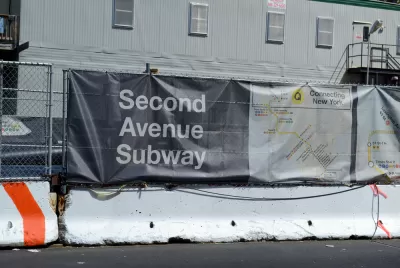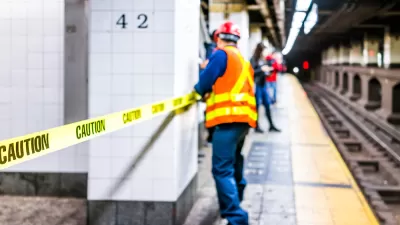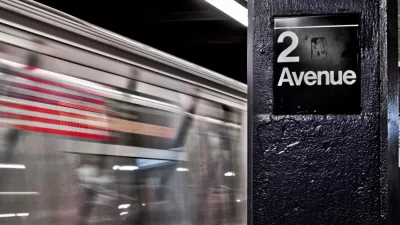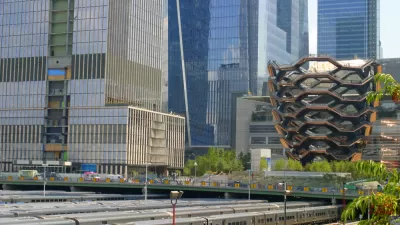There will be a lot of hoopla when the Second Avenue Subway opens in Manhattan on the first day of 2017. Some writers are making sure that one important detail isn't getting lost in the celebration.

"On January 1, the Second Avenue subway extension will open about 100 years after it was first proposed — or at least, a little bit of it will, running from 63rd Street to 96th Street," writes Josh Barro.
According to Barro, the critical component of the story about America's newest large infrastructure project is the cost: at $4.45 billion for two miles, the project is "the world's most expensive subway ever built."
"The bad news is we have been overpaying for our underground infrastructure for stupid reasons," writes Barro. "The good news is we can avoid overpaying in the future with smarter, more strategic choices."
The article goes into a feature-length detail to back those claims, citing the World Trade Center Transportation Hub, opened earlier this year at the cost of $4 billion as another prominent example of the same set of problems. With both these examples in mind, argues Barro, "[t]he main thing that seems to set apart American transit projects is engineering choices — especially choices to build bigger stations than necessary, with more complicated designs than necessary, deeper underground than is necessary."
Vincent Barone provides a similar critique in a separate article released before the subway's opening. Baron's coverage explains the viewpoints of transportation experts who "believe that the comparatively high price of subway construction in New York City could, in the short term, hinder further necessary expansion needed to support its growth."
FULL STORY: New York's incredibly expensive new subway explains why we can't have nice things

Planetizen Federal Action Tracker
A weekly monitor of how Trump’s orders and actions are impacting planners and planning in America.

Congressman Proposes Bill to Rename DC Metro “Trump Train”
The Make Autorail Great Again Act would withhold federal funding to the system until the Washington Metropolitan Area Transit Authority (WMATA), rebrands as the Washington Metropolitan Authority for Greater Access (WMAGA).

The Simple Legislative Tool Transforming Vacant Downtowns
In California, Michigan and Georgia, an easy win is bringing dollars — and delight — back to city centers.

The States Losing Rural Delivery Rooms at an Alarming Pace
In some states, as few as 9% of rural hospitals still deliver babies. As a result, rising pre-term births, no adequate pre-term care and "harrowing" close calls are a growing reality.

The Small South Asian Republic Going all in on EVs
Thanks to one simple policy change less than five years ago, 65% of new cars in this Himalayan country are now electric.

DC Backpedals on Bike Lane Protection, Swaps Barriers for Paint
Citing aesthetic concerns, the city is removing the concrete barriers and flexposts that once separated Arizona Avenue cyclists from motor vehicles.
Urban Design for Planners 1: Software Tools
This six-course series explores essential urban design concepts using open source software and equips planners with the tools they need to participate fully in the urban design process.
Planning for Universal Design
Learn the tools for implementing Universal Design in planning regulations.
Smith Gee Studio
City of Charlotte
City of Camden Redevelopment Agency
City of Astoria
Transportation Research & Education Center (TREC) at Portland State University
US High Speed Rail Association
City of Camden Redevelopment Agency
Municipality of Princeton (NJ)





























